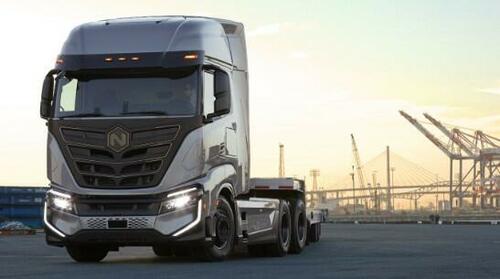
We already know that emission free or EV trucking isn't a cost efficient endeavor, which is why many companies like Pepsi have done token purchases of a couple of EV semis, but are still using ICE 18 wheelers to get product to shelves.
Today a new article from Reuters lays out the numbers behind why emission free trucking remains a fallacy: emissions-free trucks need to drop in price by up to 50% to compete with diesel models, according to a McKinsey study.
Currently, less than 2% of the EU's heavy freight vehicles are electric or hydrogen-powered, but this must rise to 40% of new sales by 2030 to meet EU climate goals. Electric trucks cost 2.5-3 times more to produce than diesel ones, and logistics companies are reluctant to bear the higher costs, making this target challenging, the report says.
McKinsey suggests electric truck prices should be no more than 30% higher than diesel models, requiring major battery advancements.
Reuters writes that a 25% reduction in charging costs and 900,000 private charging points by 2035, needing a $20 billion investment, are also key to the EU’s CO2 strategy. Additionally, European truckmakers face competition from Chinese manufacturers, who have captured 20% of the bus market with cheaper products.
A co-author of the McKinsey study said: "I don't think it's impossible that this could actually happen in electric trucks over time."
Recall we wrote earlier this year that demand for electric semis was plunging.
“The economics just don’t work for most companies,” Robert Sanchez, the chief executive of Ryder, said in May.
Ryder’s experience highlights the difficulties state and federal governments encounter in encouraging truckers to transition from polluting diesel rigs to zero-emissions vehicles, the report says.
It also indicates that significant improvements in battery weight, range, and charging times are necessary for battery-electric trucks to effectively compete with diesel rigs in the cost-sensitive freight industry.
Rakesh Aneja, head of eMobility at Daimler Truck North America, told Wall Street Journal: “Quite frankly, demand has not been as strong as what we would like.”
We already know that emission free or EV trucking isn’t a cost efficient endeavor, which is why many companies like Pepsi have done token purchases of a couple of EV semis, but are still using ICE 18 wheelers to get product to shelves.
Today a new article from Reuters lays out the numbers behind why emission free trucking remains a fallacy: emissions-free trucks need to drop in price by up to 50% to compete with diesel models, according to a McKinsey study.
Currently, less than 2% of the EU’s heavy freight vehicles are electric or hydrogen-powered, but this must rise to 40% of new sales by 2030 to meet EU climate goals. Electric trucks cost 2.5-3 times more to produce than diesel ones, and logistics companies are reluctant to bear the higher costs, making this target challenging, the report says.
McKinsey suggests electric truck prices should be no more than 30% higher than diesel models, requiring major battery advancements.
Reuters writes that a 25% reduction in charging costs and 900,000 private charging points by 2035, needing a $20 billion investment, are also key to the EU’s CO2 strategy. Additionally, European truckmakers face competition from Chinese manufacturers, who have captured 20% of the bus market with cheaper products.
A co-author of the McKinsey study said: “I don’t think it’s impossible that this could actually happen in electric trucks over time.”
Recall we wrote earlier this year that demand for electric semis was plunging.
“The economics just don’t work for most companies,” Robert Sanchez, the chief executive of Ryder, said in May.
Ryder’s experience highlights the difficulties state and federal governments encounter in encouraging truckers to transition from polluting diesel rigs to zero-emissions vehicles, the report says.
It also indicates that significant improvements in battery weight, range, and charging times are necessary for battery-electric trucks to effectively compete with diesel rigs in the cost-sensitive freight industry.
Rakesh Aneja, head of eMobility at Daimler Truck North America, told Wall Street Journal: “Quite frankly, demand has not been as strong as what we would like.”
Loading…





